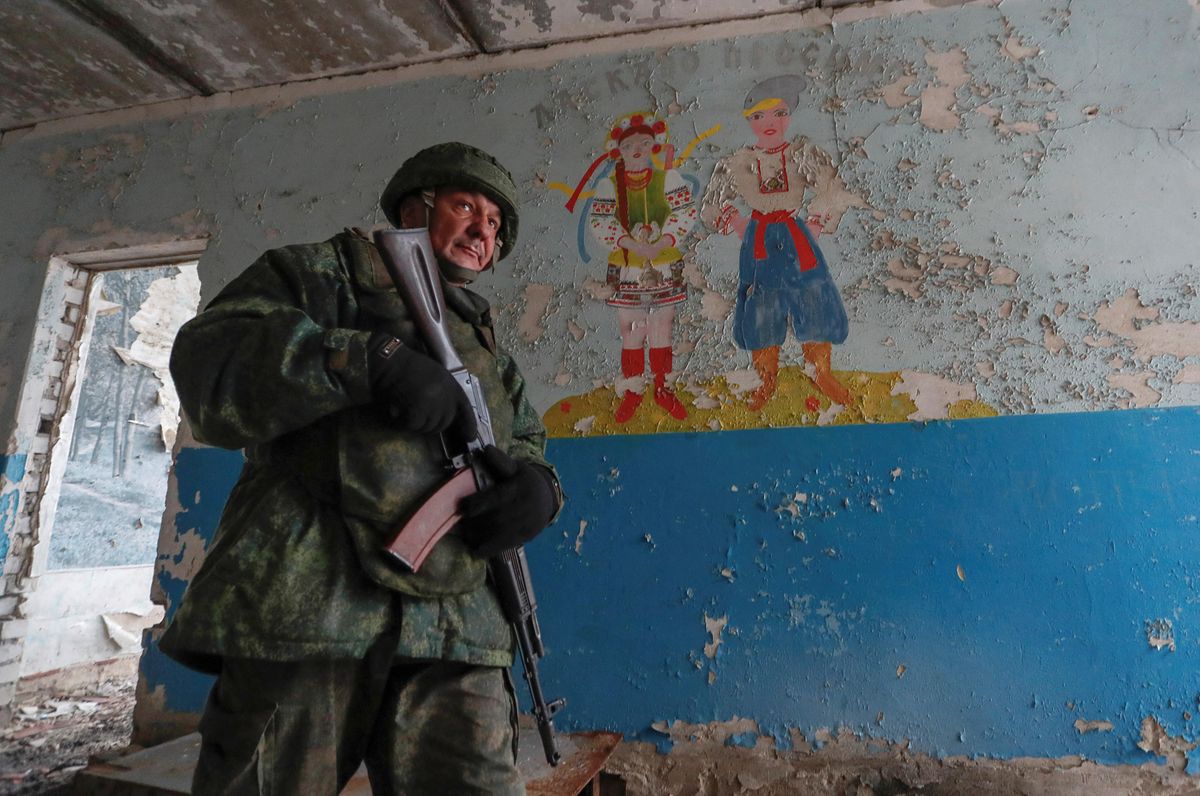The pace of Russia-Ukraine news is accelerating. Russian President Vladimir Putin says his troops are pulling back from the border, while Washington, NATO, and Kyiv say they’re not. Russia has expelled the deputy American ambassador from Moscow.
The week’s most ominous developments, however, center on the Donbas, the breakaway region of eastern Ukraine, where Russian-backed rebels and Ukrainian soldiers have been exchanging fire throughout the eight-year conflict. On Thursday, reports emerged that two schools, including a kindergarten, had been hit by shelling. Ukraine and Russia traded accusations over which side fired first, raising concerns that finger-pointing could lead to an escalation. Russia is “actively trying to provoke the Ukrainians into steps that would justify a Russian military intervention,” GZERO Media President Ian Bremmer said on Thursday in Germany ahead of the Munich Security Conference.
But there’s another Donbas development that reminds us of what Putin really wants – and signals what he might do next.
This week, Russia’s parliament voted to ask Putin to consider formal recognition of the independence of the two Donbas provinces, Donetsk and Luhansk. Ukrainian separatists there declared their independence in 2014, but no country, including Russia, has formally recognized them.
So far, Putin has resisted. He continues to insist that Ukraine honor the so-called Minsk Agreement, a peace plan that would leave the breakaway Donbas provinces as part of Ukraine – on condition they’re given “special status” and a degree of policy autonomy.
Compliance with the Minsk deal would force Ukraine’s government to rewrite its constitution. The new version would give governors of Donetsk and Luhansk – and, therefore, their sponsors in Moscow – the right to veto national security and trade policies approved by Ukraine’s national government.
In short, by keeping the Donbas provinces inside Ukraine, Putin could effectively block any Ukrainian entry into NATO or trade deals with the EU that ease Ukraine’s dependence on Russia. And it could achieve this without starting a war, suffering casualties, spending billions, or facing sanctions.
So, if Putin thinks the Donbas is useful for Russia as part of Ukraine, why did he allow Russia’s parliament to suggest formal recognition for Donbas independence? As Bremmer noted from Munich, “Suddenly, this week, it goes to the Kremlin for approval for that recognition. That’s a very significant move.”
Formal Russian recognition of the region’s independence would mark a major turning point in Putin’s Ukraine strategy, but it’s possible that Putin has decided he needs a face-saving way to avoid a costly war. He’d be declaring the Minsk deal dead, a sign of grudging acceptance that he can’t force Ukraine to embed Russian power into Ukraine’s constitution.
And maybe Putin has found another way to declare victory. The Russian government filed a report at the United Nations on Thursday alleging that Ukraine is guilty of “genocide of the Russian-speaking population” in the Donbas. Putin himself has made that charge repeatedly.
Accepting Donbas independence and offering public support for its leaders would score Putin points at home as the man who stopped a “genocide” and defended Russians abroad — and he could do that without going to war.
Putin could also be looking for an excuse to move many more Russian troops into the Donbas to intensify the military threat to Kyiv in hopes of winning the promise he wants that Ukraine will never join NATO.
The view from Kyiv
Some analysts argue that Ukraine should let the Donbas go. If those provinces were independent, there would be far fewer ethnic Russians left in the rest of Ukraine, and it would be much harder for Russia to manipulate Ukraine’s domestic politics.
But Zelensky has plenty of rivals at home who will call any concession to Moscow an act of cowardice and treason. Ukrainian troops still control about two-thirds of Donbas territory, though less than half its population. To withdraw them, ceding land that even Russia says is still part of Ukraine, remains politically impossible.
Putin appears to be weighing his options. But the possible Russian recognition of Donbas independence just became a story to watch closely.



















